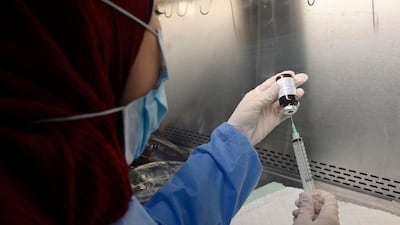“Financial toxicity” is a term used in medicine to describe the distress patients feel when facing significant out-of-pocket payments for treatment. As the phrase suggests, being unable to afford essential medicines or therapies either for oneself or for loved ones can be an upsetting and frightening experience.
Such anxiety is compounded when the illness is a potentially life-threatening one, such as cancer. The US National Cancer Institute says some of those who beat the disease reported spending more than 20 per cent of their annual income on medical care. Although ground-breaking advances in cancer treatment have been made over the years, some cutting-edge developments in immunotherapy can be prohibitively expensive.
For patients to know that a potentially life-saving treatment exists but remains out of reach is an intolerable situation. The need to banish this “financial toxicity” is behind some of the advanced medical innovations that will be on display over the coming days at Abu Dhabi Global Health Week. Among them is the launch of healthcare group Burjeel Holdings’ plan to reduce the cost of CAR T-cell therapy, a type of immunotherapy that collects a patient’s blood, isolates their immune cells and modifies them in a lab so they can recognise and attack cancer.

Certainly, there are many ways – in theory – to cut the cost of such advanced cancer treatments but many of these require policy and market changes such as price capping, outcomes-based agreements and the promotion of market competition. Such solutions also take time and rely on building political and legislative consensus. Burjeel is working on another approach – cutting costs by bringing treatment closer to home.
In a recent interview with The National, Dr Ajlan Al Zaki, an Emirati specialist based at Burjeel Hospital in Abu Dhabi, talked about CAR T-cell therapy and described how instead of shipping patient cells abroad for processing, he hoped to set up a lab in the UAE to perform the entire process domestically: “In the US, for one patient, one single infusion can cost several hundred thousand dollars – around $500,000 for just the infusion itself. That doesn’t even take into account hospitalisation, toxicities or medications to treat those toxicities. The total cost can easily go above $1 million per patient."
By decentralising the manufacturing process, Dr Al Zaki added, “we would basically manufacture the CAR T-cells locally. That would significantly cut down the cost”.
The benefits of such an approach have been recognised elsewhere. Speaking to The National last October, Dr Boro Dropulic, executive director of Caring Cross, a US-based non-profit organisation, said the shipping of cells from hospitals to a large central manufacturing facility and back was expensive to establish and maintain. “By bringing manufacturing of cells to the place where patients come for care, we can reduce the cost to a tenth of the current cost when coupled with simple and efficient manufacturing processes and materials,” Dr Dropulic added.
Being ahead of the curve scientifically is important, but being able to share the benefits of such discoveries with as many people as possible is what makes events like Abu Dhabi Global Health Week one to watch. Technical brilliance coupled with accessibility is what will give hope to those suffering from serious illness, no matter their financial background.


